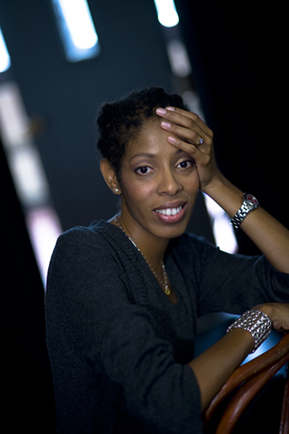Diamond Shines at CFA
New playwriting prof blends professional, student experience

It might seem unusual that an established playwright, one who adapted a controversial Toni Morrison novel to much acclaim and is on the faculty at BU’s school of theatre, would still feel driven to pursue an M.F.A. in playwriting.
But Lydia Diamond (GRS’09) is not your usual playwright.
“Derek Walcott, who was a hero of mine prior to my ever knowing I would study with him, was one reason I thought it would be nice to do the M.F.A.,” Diamond says of the Nobel laureate and former creative writing professor at the Graduate School of Arts and Sciences, who retired this year.
But the biggest reason? Diamond finally felt ready.
“I feel a little vulnerable sharing this in an article, because I do encourage my students to find their way back to graduate school,” says Diamond, a College of Fine Arts assistant professor of playwriting. “But I was resistant. A lot of graduate playwriting programs are competitive, and weird, frankly, even the very good ones. As an actor, I never did well in contentious spaces.
“So I come to this writing program with a little more maturity and sense of myself as an artist,” she says, “which gives me room, I hope, to actually hear what people are telling me. I don’t have to be defensive. I know I’m a playwright.”
Diamond, who joined the BU faculty this fall, is certainly that. A 1991 graduate of Northwestern University’s drama program and a Huntington Theatre fellow, she’s written a handful of prize-winning plays. One of them, Voyeurs de Venus, set on Martha’s Vineyard, will be staged in a few weeks by Boston’s Company One. Diamond’s low-key and thoughtful personality — she carefully considers her words, speaking slowly and occasionally apologizing for her overheated office — has already made her a popular presence in BU’s theater community, whether at the front of the classroom, in the halls, or around the graduate workshop table.
“It’s always a thrill to have a compatriot who can hit the ball back,” says Kate Snodgrass (GRS’90), artistic director of the Boston Playwrights’ Theatre and a professor of playwriting in the GRS Creative Writing Program. “Last year, most of Lydia’s fellow graduate students were theater professors from other universities and trained actors and directors who had a great deal of theatrical experience. The conversations in and out of class were a cut above the norm in my teaching experience. They were demanding and insightful from the practitioners’ point of view.”
Diamond, who teaches advanced playwriting, advanced adaptation, and several ensemble classes, says she finds BU’s theater school unique. “It’s run very much like a theater company, which is the most important way to teach young people how to work in ensembles, and to be generous, responsible, dedicated, driven artists. There’s something very special happening in this department, so it’s exciting to be here.”
The feeling is mutual.
“Lydia represents a compelling new generation of significant American playwrights,” says Jim Petosa, director of the school of theatre. “She writes plays that are complex in terms of their sociological and psychological dimensions. Their artfulness lies in the depth of their humanity, the strength of their action, and their originality. As a professor, she has the ability to give young writers permission to tell stories that reveal their passion, but always doing so with a strong sense of the dramatic art.”
Among Diamond’s standout accomplishments is her adaptation two years ago of Toni Morrison’s 1970 novel The Bluest Eye. The tale, set in the Midwest during the Great Depression, deals with racism, incest, and child molestation.
She admits she was daunted by the task. “Adaptation is challenging anyway,” she says. “You’re distilling a story that’s expansive. And with the added pressure that with Toni Morrison there were great expectations and that people have great affection for that novel, it was very scary.”
She says that working on the adaptation coincided with the birth of her son, and that helped her find her way. “My baby was brand-new when I started adapting,” she says. “It became very spiritual. The story became mine as much as Morrison’s. I had to let go of the fear of failure and embrace the storytelling.”
Initially, the play was to be performed only at Chicago’s Steppenwolf Theatre “because Morrison really doesn’t allow derivatives of her work,” Diamond says. But the play won a Black Arts Alliance Image Award and is now staged in cities around the country. “I keep hearing about productions I had no idea about,” she says.
Her other works include Stage Black, The Gift Horse, Stick Fly, and The Inside. She’s wrapping up another commission for Steppenwolf as well as for the McCarter Theatre Center in Princeton, N.J. She’s also adapting Journey to the Land of No by Iranian-American writer and former 60 Minutes producer Roya Hakakian.
Diamond, who grew up “all over the place” before settling in Chicago for 17 years, says she’s excited to call Boston home. Its vibrant theater scene, she says, is on the “brink of really exploding.”
Caleb Daniloff can be reached at cdanilof@bu.edu.
Comments & Discussion
Boston University moderates comments to facilitate an informed, substantive, civil conversation. Abusive, profane, self-promotional, misleading, incoherent or off-topic comments will be rejected. Moderators are staffed during regular business hours (EST) and can only accept comments written in English. Statistics or facts must include a citation or a link to the citation.